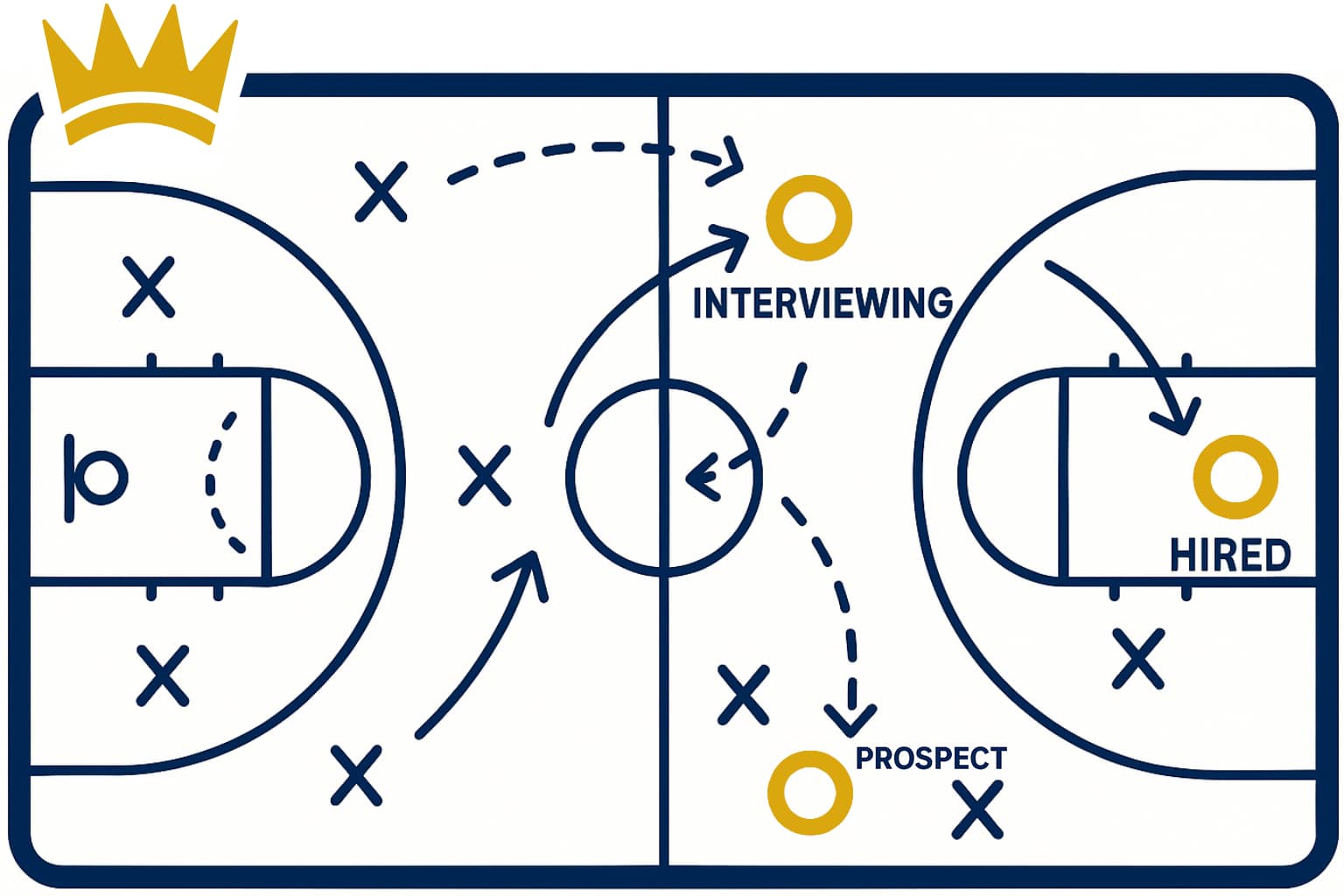
Recruiting Strategies: Drawing Parallels with Game Planning
|
In both basketball and recruiting, a winning strategy doesn’t come from winging it. It comes from preparation, anticipation, and—most importantly—execution. Just like a coach wouldn’t send their team onto the court without a game plan, a successful recruiter knows that bringing in top talent requires more than just posting job openings and hoping for the best. It takes strategic thinking and a keen understanding of the playing field.
Preparation: The foundation of success
Ask any great coach, and they’ll tell you that preparation is the bedrock of any solid game plan. You don’t just study your own team; you study the competition, analyze past games, and understand the conditions that will affect the outcome.
In recruitment, preparation involves understanding the talent market, identifying gaps in your organization or your client’s team, and aligning your recruitment efforts with business goals.
I’ve seen companies make the mistake of rushing into hiring without a clear understanding of what they need. It’s like stepping onto the court without knowing who your star players are or what plays you’ll run.
By taking the time to define the ideal candidate profile, understand the cultural fit, and set clear expectations, you lay the groundwork for finding that MVP who will drive your team forward.
Flexibility: Adapting to the game’s flow
Of course, even the best-laid plans need flexibility. In basketball, a good coach is constantly adapting—changing defensive strategies, subbing in players, and adjusting to the opponent’s tactics.
The same goes for recruitment. The talent market is constantly shifting, influenced by factors like economic changes, industry trends, and evolving candidate expectations.
Take, for example, the rapid changes we’ve seen in the past few years with remote work becoming the new norm. Those who adapted quickly to offer flexible work options won the talent war, while those who didn’t were left scrambling.
It’s about anticipating these shifts and being ready to pivot. A successful recruiter, like a smart coach, knows that staying rigid leads to missed opportunities.

Execution: Turning strategy into results
Now, having a game plan is one thing; executing it is another. On the court, it’s not just about drawing up plays but making sure the team understands them, buys into them, and can execute them under pressure.
Similarly, in recruitment, you can have the most sophisticated strategy on paper, but without the right execution, it’s just that—paper.
Execution in recruitment means building strong pipelines, leveraging technology for efficiency, engaging with candidates authentically, and ensuring a seamless hiring process. It’s about making sure every player—your recruiters, hiring managers, and even your candidates—understands the game plan and their role in it.
Strategic Thinking: The heart of it all
At the core of both a solid game plan and an effective recruitment strategy is strategic thinking. In basketball, you’re constantly thinking several plays ahead. You’re reading the game, anticipating moves, and setting up your team for success.
When finding talent, strategic thinking means looking beyond the immediate need. It’s about understanding the broader business goals, future talent needs, and how today’s hires will impact tomorrow’s success
Consider how companies that think strategically about recruitment—aligning it with long-term goals, building employer brand equity, and fostering talent development—are not just filling positions. They’re building championship teams.
Five key takeaways for strategic recruitment planning:
- Understand the playing field: Research the talent market, know the competition, and define what success looks like for your team or organization.
- Stay agile: Be prepared to pivot and adapt your strategy in response to changing conditions, whether it’s market trends or internal shifts.
- Focus on execution: Ensure that every stakeholder understands the recruitment strategy and their role in executing it effectively.
- Leverage technology and data: Use data-driven insights to inform your strategy, predict market trends, and improve decision-making processes.
- Think beyond the immediate: Align your recruitment strategy with broader business goals and future needs. You’re not just filling seats; you’re building a legacy.
Whether you’re building a game plan for the court or crafting a recruitment strategy for the boardroom, remember this: it’s all about preparation, flexibility, and strategic execution.
Game on!


